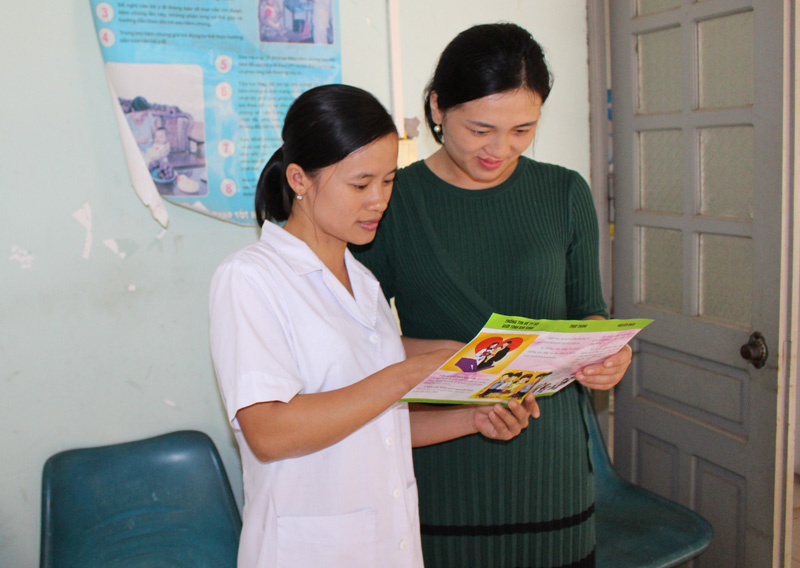
(HBO) – Authorities of Mai Ha commune in Mai Chau district consider improving population quality as a prerequisite for the locality’s socio-economic development. Therefore, thanks to an array of solutions, local population quality has gradually been improved.

A population-family planning worker gives information to
local residents.
Firstly, Mai Ha commune has stepped up the dissemination
of information to each family and resident. The board for population and family
planning has coordinated with associations to raise public awareness of each
collective and individual’s role in implementing population policies, the
importance of prenatal and newborn screening, adolescent reproductive health,
and the care for the elderly. Locals have also accessed information about
solutions to reduce the thalassemia incidence, the impact of gender selection,
and consequences of child marriages.
Ngan Thu Thuy, a population-family planning
worker, said in Mai Ha commune, the pre-marriage and thalassemia clubs have
proved effective. The three pre-marriage clubs, chaired by the Secretary of the
commune’s Ho Chi Minh Communist Youth Union, have updated youngsters and
students about the Law on Marriage and Family and knowledge about adolescent
reproductive health.
Meanwhile, the thalassemia club has called for
public support for the six-year-old Vi Bao Tran in Lau hamlet – the only
thalassemia case in Mai Ha commune. Tran has to receive blood transfusion once
a month amid difficulties facing her family. Thanks to the assistance from the
club and neighbours, her health has become stable.
The commune has also effectively carried out
plans on prenatal and newborn screening, minimising gender imbalance at birth,
and mobilising the public’s participation in contraceptive method provision.
As a result, 90 percent of local pregnant women
have received check-ups and tetanus vaccines, while all of them have received
HIV-related advices and tests. People have become more active in buying birth
control methods, instead of only receiving free support./.
The Department of Education and Training of Hoa Binh province held a conference on March 18 to review the performance of the "Safe and Happy School" Project and set out tasks for 2025. The project, funded by the Taiwan Fund for Children and Families (TFCF), aims to create a safe, inclusive, and supportive learning environment for students. The event saw the attendance of representatives from the TFCF and 26 beneficiary schools.
With over 70% of their workers being women, trade unions across industrial parks (IPs) in Hoa Binh have been actively safeguarding their legal rights and interests while implementing initiatives to improve their income and well-being.
In recent years, the Hoa Binh provincial General Hospital has continuously innovated itself and improved the quality of medical services to meet the increasing needs of local people. With substantial investments in infrastructure and modern equipment, along with a team of highly qualified doctors and nurses, the hospital has gradually established itself as one of the leading medical units in the Northwestern region and a trusted destination for healthcare for people inside and outside the province.
From mastering the fundamentals of programming to achieving national recognition, the Programming Club of the Le Van Tam Primary School (STAR LVT28) in Hoa Binh city has made remarkable strides in the field of robotics.
The Ho Chi Minh Communist Youth Union Committee and the Vietnam Youth Federation chapter of Hoa Binh province organised a programme on March 12 to launch the "Digital Literacy" movement and an online quiz on the resolutions of the Vietnam Youth Federation congresses at all levels, as well as the Politburo's Resolution No. 57-NQ/TW on breakthroughs in the development of science, technology, innovation, and national digital transformation.
As climate change grows more unpredictable, the development of production forests has become essential - not just for economic growth, but for safeguarding the environment and maintaining ecosystem balance. By boosting local incomes, curbing natural disasters, preventing soil erosion, and protecting water resources, these forests play a crucial role in sustainable development.



